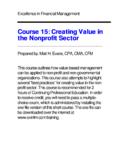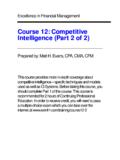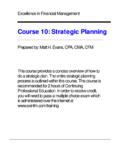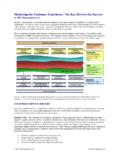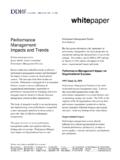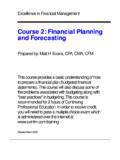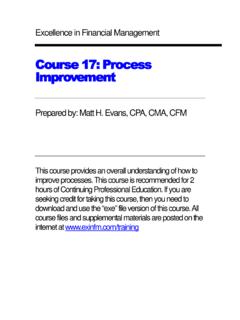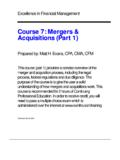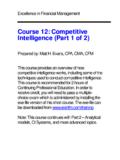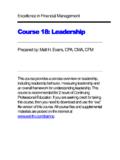Transcription of Course 8: Creating Value through Financial …
1 Course 8: Creating ValueCourse 8: Creating ValueCourse 8: Creating ValueCourse 8: Creating Valuethrough Financialthrough Financialthrough Financialthrough FinancialManagementManagementManagementM anagementPrepared by: Matt H. Evans, CPA, CMA, CFMThis Course provides a concise overview of howfinancial management is used to create highermarket values for an organization. This Course dealswith advanced topics and the user should have agood working knowledge of both accounting andfinancial management prior to taking this Course is recommended for 2 hours ofContinuing Professional Education.
2 In order toreceive credit, you will need to pass a multiple-choice exam which is administered over the internetat December 1999 Excellence in Financial ManagementThe New Role of FinanceReal Financial ManagementWhen we look at the typical Financial function within an organization, we will find a host ofaccounting activities: processing of payables, customer invoicing, payroll administration, Financial reporting, etc. According to one survey, over 70% of all Financial managementfunctions are spent on the processing of accounting transactions.
3 Less than 20% of financialmanagement is spent on "real" Financial management , things like performance measurement,risk management , forecasting, strategic planning, investment analysis, competitiveintelligence, etc. All of these things are where real Value comes from. Therefore, one of thefirst steps for Financial functions to take when it comes to Creating Value is to move out of thetraditional accounting box and into real Financial overall goal is to move into more Value -added type activities, things that have an impacton improving company performance.
4 Adopting a set of "best practices in financialmanagement" can help transform the Financial function into a driver of Value . Best Practicesrefers to organizing the accounting and finance functions into a decision support function forthe entire organization. Best Practices can encompass many things, such as:! Organizing around results, such as quicker closings through soft general ledger closings.! Processing data only once in order to reduce cycle times.! Structuring data so that it provides information and doesn't just occupy storage space.
5 ! Leveraging people and technology to improve transaction processing. This includes allkinds of applications - electronic payroll processing, purchase credit cards for payables,electronic data interchange, the Accounting HabitOne of the most important steps to making the Financial function a source of Value is to departfrom the traditional accounting model. This requires a different way of thinking about how wemeasure performance. In Financial management , the emphasis is on increasing Value and notnecessarily earnings.
6 In order to make this transition over to Value -creation, it is important tounderstand why accounting runs contrary to we talk about Value , we are referring to the market Value of the organization. Marketvalues are determined by the future expected cash flows that will be generated over the life ofthe business. The problem with the traditional accounting model is that all of the emphasis isChapter12on earnings, especially the quantity of earnings. What counts in valuations is the quality of theearnings. In Financial management , we call this economic performance (such as cash flows)as opposed to accounting performance (such as net income).
7 Accounting distorts truemeasures of Value and we are unable to understand economic example, it is quite common to recognize earnings regardless if the cash is , expenditures that involve cash disbursements may provide future economicbenefits that are ignored by accounting. If you were to spend $ 45,000 obtaining an MBAfrom the Wharton Business School, accounting would expense this investment. However,when we look at economic performance we would realize that this investment providessubstantial increased cash flows over the life of your career.
8 Therefore, accountingperformance and economic performance are dramatically , most people look to Financial statements when measuring performance. If youlook at the Balance Sheet, you will find book values of assets and not market values ofassets. The Balance Sheet discloses total amounts invested. It tells you nothing about thesuccess of these investments; have the assets earned more than the cost of capital?So why are we so confined to Financial statements for measuring performance? Part of theproblem is our obsession with earnings.
9 Like kids addicted to sugar, we can't get enough ofthe stuff. One reason people are fooled over the connection between earnings and marketvalue is the fact that cash flow and earnings often move in similar directions. As a result, it iseasy to conclude that earnings are the source of , the real lesson is learned when the two (cash flow and earnings) depart. A goodcase in point are small capitalized companies, especially internet companies like poor earnings, the market values for companies like ebay seems to escalate out-of-sight.
10 What is going on? What is happening is that the marketplace determines Value basedon what it expects in the future and not on what past earnings were. The marketplacecomprehends that ebay will generate a lot of future cash flows because it has reinvented howpeople buy and sell merchandise over the internet. Financial Statements lag behind and failto recognize the true sources of Value in the marketplace. As the President of Coca-Colawould say - "the guy with the biggest cash flow wins!" Therefore, it is imperative foraccounting and Financial management to think in terms of economic (cash flow) performanceand not just accounting Financial function can play a lead role in emphasizing things that are important to trueeconomic performance.
